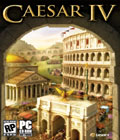Developed by Tilted Mill, Caesar IV advances, refines and updates the city-building gameplay pioneered by Caesar III, while remaining true to its predecessor's proud legacy. In Caesar IV, players take on the role of an aspiring provincial governor within Caesar's empire as they build and manage an individual ancient Roman city and its province.
Players lay out each city, road by road and building by building, making sure citizens have all they need to remain healthy, happy and safe from barbarian threats. As the city grows from a simple village to a cosmopolitan metropolis, so too do the challenges it presents. The ultimate goal is to rise among the political ranks of the empire, and become Caesar.
With full 3D presentation, and all-new realistic citizen behaviors, Caesar IV is sure to please fans of the series as well as strategy gamers in general.
Caesar IV Economic System Details
Industry Overview
- Raw materials are consumed by factories to produce finished goods for citizens. These goods are required by citizens to remain content and improve their individual households.
- Trading partners and cohorts may wish to purchase materials for weaponry which they will need in order to be effective in battle.
- The availability of the raw materials used to produce finished goods determines the type and number of factories that should be built.
- Small isolated settlements comprised solely of the working class will have modest needs for finished goods.
- Thriving and cosmopolitan cities, bustling with well-to-do shoppers and traders utilizing its markets, Trade Depots and Trade Ports, have a seemingly insatiable appetite for finished goods.
- Each type of factory requires a certain amount of raw material along with working class labor to produce finished goods.
- Cart pushers travel city roads to retrieve the stores of raw materials that have accumulated at camps, warehouses, depots and ports. Raw materials are gradually consumed for the production of finished goods once they arrive at the factories.
- Markets, depots, ports, guilds, armories and warehouses send cart pushers along city roads to retrieve finished goods from factories. These goods are important because factories use them as a function of their business or to store them because they have been ordered to do so.
Markets and Shopping
- Citizens shop at markets for food and other essential household items in order to maintain health and happiness, and improve their homes.
- There are four market types players can build: food, common goods, luxury goods and exotic goods
Trade Details and Tips
- Trade is one of the most important tools a Governor has at his or her disposal.
- Unique resources that can't be produced by one city (food, raw materials, goods and armaments) may sometimes be purchased from other cities. Conversely, other cities that lack the resources produced by your city may wish to purchase them from you.
- Exotic goods are an important component in generating lucrative property taxes from villas, but are only produced in foreign lands, creating the need for trade routes.
- Trade routes are expensive to open, but well worth it when rare and necessary resources are only available through importation. Additionally, opening trade routes can prove beneficial when treasury funds are significantly increased by exporting surplus resources.
- Costs and prices of importing or exporting resources may vary depending upon where your city is located and may also change over the course of an assignment.
- Trade depots are visited by traders who carry their goods on land routes via caravan. Conversely, trade ports are visited by traders who only carry their goods by boat.
More articles about Caesar IV












 Caesar IV advances, refines and updates the city-building gameplay pioneered by Caesar III, while remaining true to its predecessor's proud legacy. In Caesar IV, players take on the role of an aspiring provincial governor within Caesar's empire as they build and manage an individual ancient Roman city and its province.
Caesar IV advances, refines and updates the city-building gameplay pioneered by Caesar III, while remaining true to its predecessor's proud legacy. In Caesar IV, players take on the role of an aspiring provincial governor within Caesar's empire as they build and manage an individual ancient Roman city and its province.




















